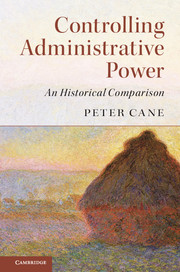Book contents
- Frontmatter
- Dedication
- Contents
- Preface
- Table of cases
- Table of legislation
- 1 Introduction: concepts and methodology
- 2 The English system of government
- 3 The US system of government
- 4 The Australian system of government
- 5 The development and institutional structure of control regimes
- 6 Administrative interpretation
- 7 Administrative fact-finding and policy-making
- 8 Administrative rule-making
- 9 Administrative adjudication
- 10 Private law controls
- 11 Controlling information
- 12 The New PublicManagement
- 13 Controlling the controllers
- 14 Concluding reflections on methodology and themes
- Bibliography
- Index
11 - Controlling information
Published online by Cambridge University Press: 05 March 2016
- Frontmatter
- Dedication
- Contents
- Preface
- Table of cases
- Table of legislation
- 1 Introduction: concepts and methodology
- 2 The English system of government
- 3 The US system of government
- 4 The Australian system of government
- 5 The development and institutional structure of control regimes
- 6 Administrative interpretation
- 7 Administrative fact-finding and policy-making
- 8 Administrative rule-making
- 9 Administrative adjudication
- 10 Private law controls
- 11 Controlling information
- 12 The New PublicManagement
- 13 Controlling the controllers
- 14 Concluding reflections on methodology and themes
- Bibliography
- Index
Summary
A paradox
At its broadest, the main hypothesis of this book is that similarities and differences between regimes for controlling administrative power (control regimes) in various jurisdictions may partly be explained by reference to the systems of government of which those regimes may be understood as sub-systems. The previous chapters have tested this (‘structural’) hypothesis in various contexts where such argumentation is not common. However, there is one area in which the sort of arguments I have made so far do find a place in the existing literature, and that is access to (‘freedom of’) government-held information. In this context, it is often said that ‘Westminster-style’ governments – governments of concentrated power, in the terms used in this book – tend to be ‘secretive’ and closed. On the other hand, the US system of government is commonly noted (and generally praised) for its openness and transparency. However, while it is true that the US Congress first enacted freedom of information (FOI) legislation more than thirty years before the Australian Parliament and more than fifty years before it was enacted in England, all three jurisdictions now have an FOI regime with essentially the same structure, features and functions. In general terms, these regimes create a widely-held right to request access to documents held by the government, subject to a more-or-less extensive list of exemptions. Under each of the regimes, mechanisms are provided for challenging refusals to disclose. All the regimes additionally impose on government agencies positive obligations to publish certain types of information without request. In all jurisdictions, concerns have been expressed about the impact of privatisation and outsourcing of the provision of public services on the coverage of the FOI legislation. Each regime operates against a background of legislation that criminalises certain categories of classified information and legislation specifying the period for which archived documents can be withheld from public release. In all jurisdictions, there is more-or-less powerful legislation to protect whistle-blowers.
Although there are numerous differences of detail between the FOI regimes in our three jurisdictions, they do not detract from the striking appearance of similarity amongst the current legal situations in England, the United States and Australia, respectively.
- Type
- Chapter
- Information
- Controlling Administrative PowerAn Historical Comparison, pp. 415 - 436Publisher: Cambridge University PressPrint publication year: 2016



